UK Travel & Tourism: A Detailed Analysis of Legislation and Ethics
VerifiedAdded on 2024/05/21
|14
|3273
|146
Report
AI Summary
This report provides a comprehensive analysis of legislation and ethics within the UK travel and tourism sector. It begins by explaining the legal and regulatory framework with reference to England and Wales, including the regulatory structure, relevant acts, and court systems. The report then discusses surface, sea, and air transport laws in relation to passenger carriage within the UK's legal framework. It evaluates the impacts of health, safety, and security legislation on tour operators and travel agencies, analyzes legislation related to equality, and explains consumer protection laws. Furthermore, the report includes a letter explaining contract legislation to a travel assistant. Finally, it examines ethical dilemmas faced by the travel and tourism sector and analyzes the corporate social responsibility (CSR) policy of a specified travel and tourism business.
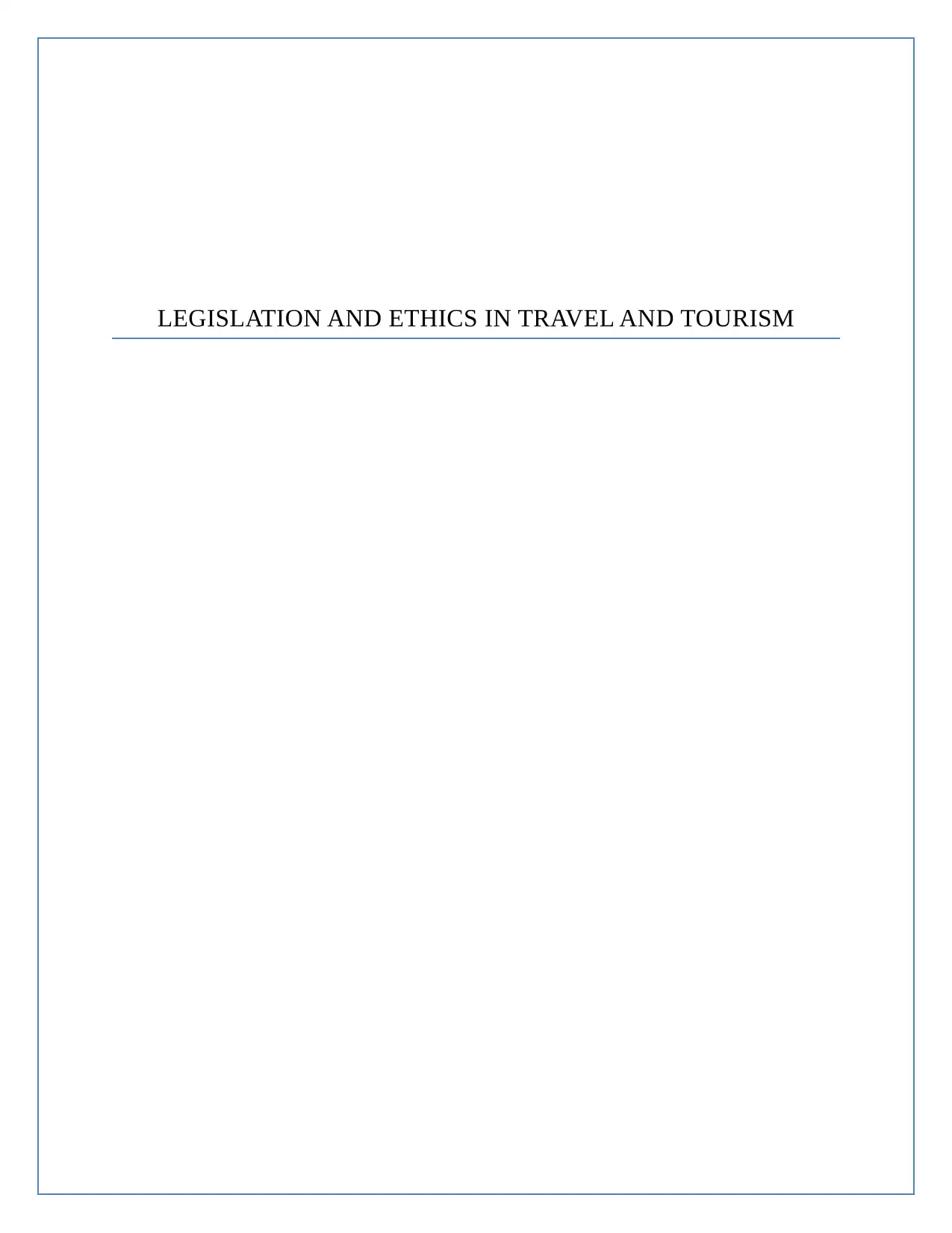
LEGISLATION AND ETHICS IN TRAVEL AND TOURISM
Paraphrase This Document
Need a fresh take? Get an instant paraphrase of this document with our AI Paraphraser
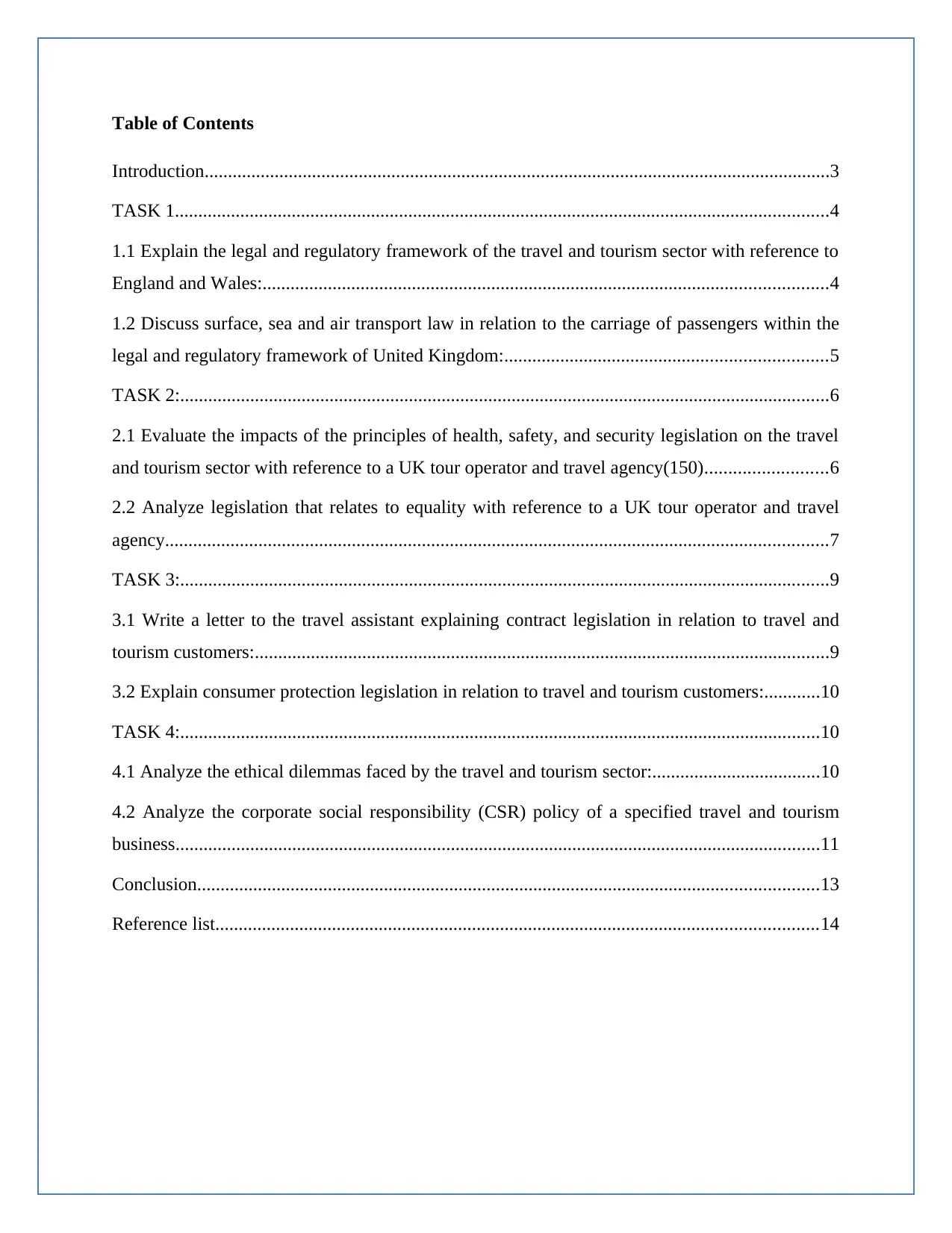
Table of Contents
Introduction......................................................................................................................................3
TASK 1............................................................................................................................................4
1.1 Explain the legal and regulatory framework of the travel and tourism sector with reference to
England and Wales:.........................................................................................................................4
1.2 Discuss surface, sea and air transport law in relation to the carriage of passengers within the
legal and regulatory framework of United Kingdom:.....................................................................5
TASK 2:...........................................................................................................................................6
2.1 Evaluate the impacts of the principles of health, safety, and security legislation on the travel
and tourism sector with reference to a UK tour operator and travel agency(150)..........................6
2.2 Analyze legislation that relates to equality with reference to a UK tour operator and travel
agency..............................................................................................................................................7
TASK 3:...........................................................................................................................................9
3.1 Write a letter to the travel assistant explaining contract legislation in relation to travel and
tourism customers:...........................................................................................................................9
3.2 Explain consumer protection legislation in relation to travel and tourism customers:............10
TASK 4:.........................................................................................................................................10
4.1 Analyze the ethical dilemmas faced by the travel and tourism sector:....................................10
4.2 Analyze the corporate social responsibility (CSR) policy of a specified travel and tourism
business..........................................................................................................................................11
Conclusion.....................................................................................................................................13
Reference list.................................................................................................................................14
Introduction......................................................................................................................................3
TASK 1............................................................................................................................................4
1.1 Explain the legal and regulatory framework of the travel and tourism sector with reference to
England and Wales:.........................................................................................................................4
1.2 Discuss surface, sea and air transport law in relation to the carriage of passengers within the
legal and regulatory framework of United Kingdom:.....................................................................5
TASK 2:...........................................................................................................................................6
2.1 Evaluate the impacts of the principles of health, safety, and security legislation on the travel
and tourism sector with reference to a UK tour operator and travel agency(150)..........................6
2.2 Analyze legislation that relates to equality with reference to a UK tour operator and travel
agency..............................................................................................................................................7
TASK 3:...........................................................................................................................................9
3.1 Write a letter to the travel assistant explaining contract legislation in relation to travel and
tourism customers:...........................................................................................................................9
3.2 Explain consumer protection legislation in relation to travel and tourism customers:............10
TASK 4:.........................................................................................................................................10
4.1 Analyze the ethical dilemmas faced by the travel and tourism sector:....................................10
4.2 Analyze the corporate social responsibility (CSR) policy of a specified travel and tourism
business..........................................................................................................................................11
Conclusion.....................................................................................................................................13
Reference list.................................................................................................................................14
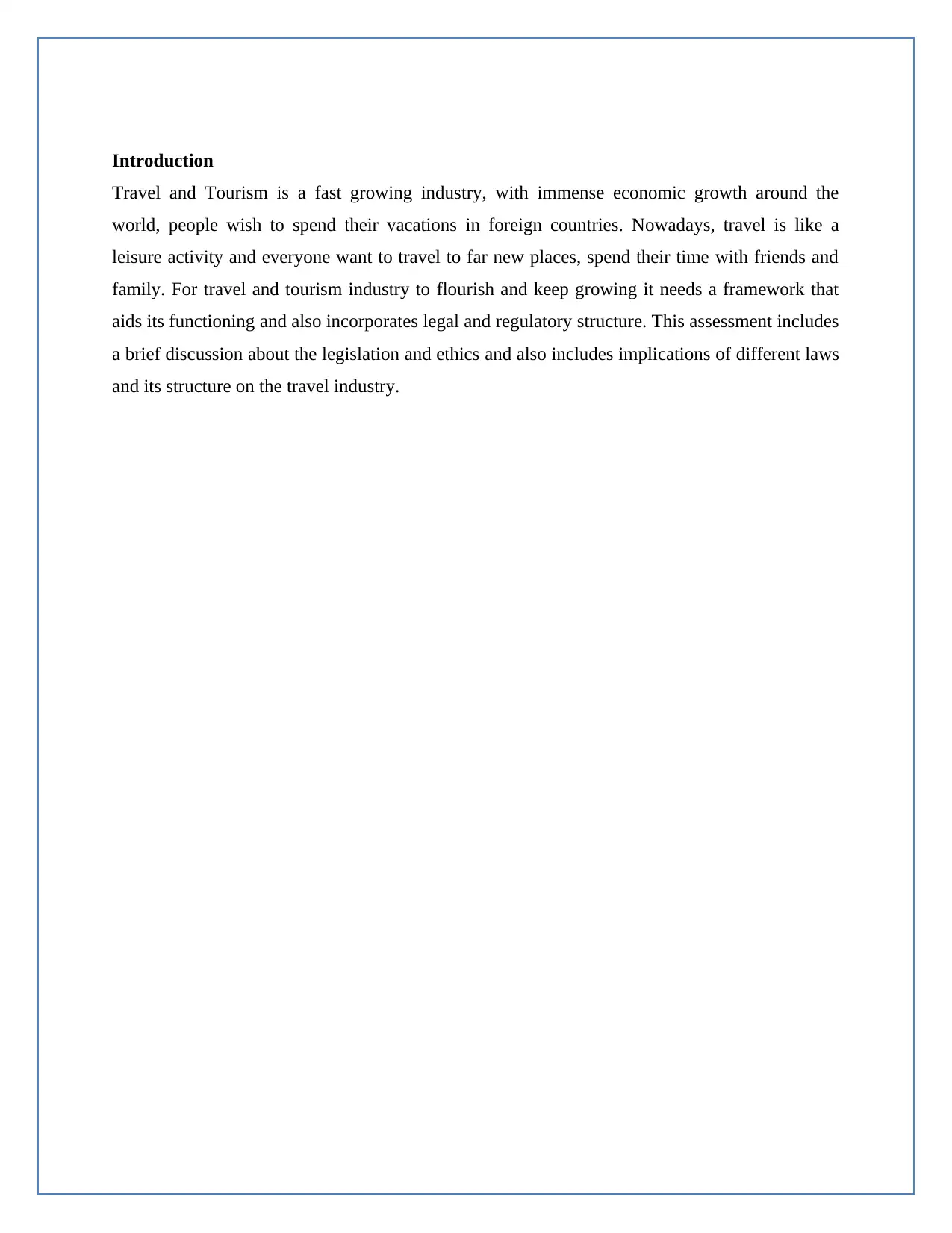
Introduction
Travel and Tourism is a fast growing industry, with immense economic growth around the
world, people wish to spend their vacations in foreign countries. Nowadays, travel is like a
leisure activity and everyone want to travel to far new places, spend their time with friends and
family. For travel and tourism industry to flourish and keep growing it needs a framework that
aids its functioning and also incorporates legal and regulatory structure. This assessment includes
a brief discussion about the legislation and ethics and also includes implications of different laws
and its structure on the travel industry.
Travel and Tourism is a fast growing industry, with immense economic growth around the
world, people wish to spend their vacations in foreign countries. Nowadays, travel is like a
leisure activity and everyone want to travel to far new places, spend their time with friends and
family. For travel and tourism industry to flourish and keep growing it needs a framework that
aids its functioning and also incorporates legal and regulatory structure. This assessment includes
a brief discussion about the legislation and ethics and also includes implications of different laws
and its structure on the travel industry.
⊘ This is a preview!⊘
Do you want full access?
Subscribe today to unlock all pages.

Trusted by 1+ million students worldwide
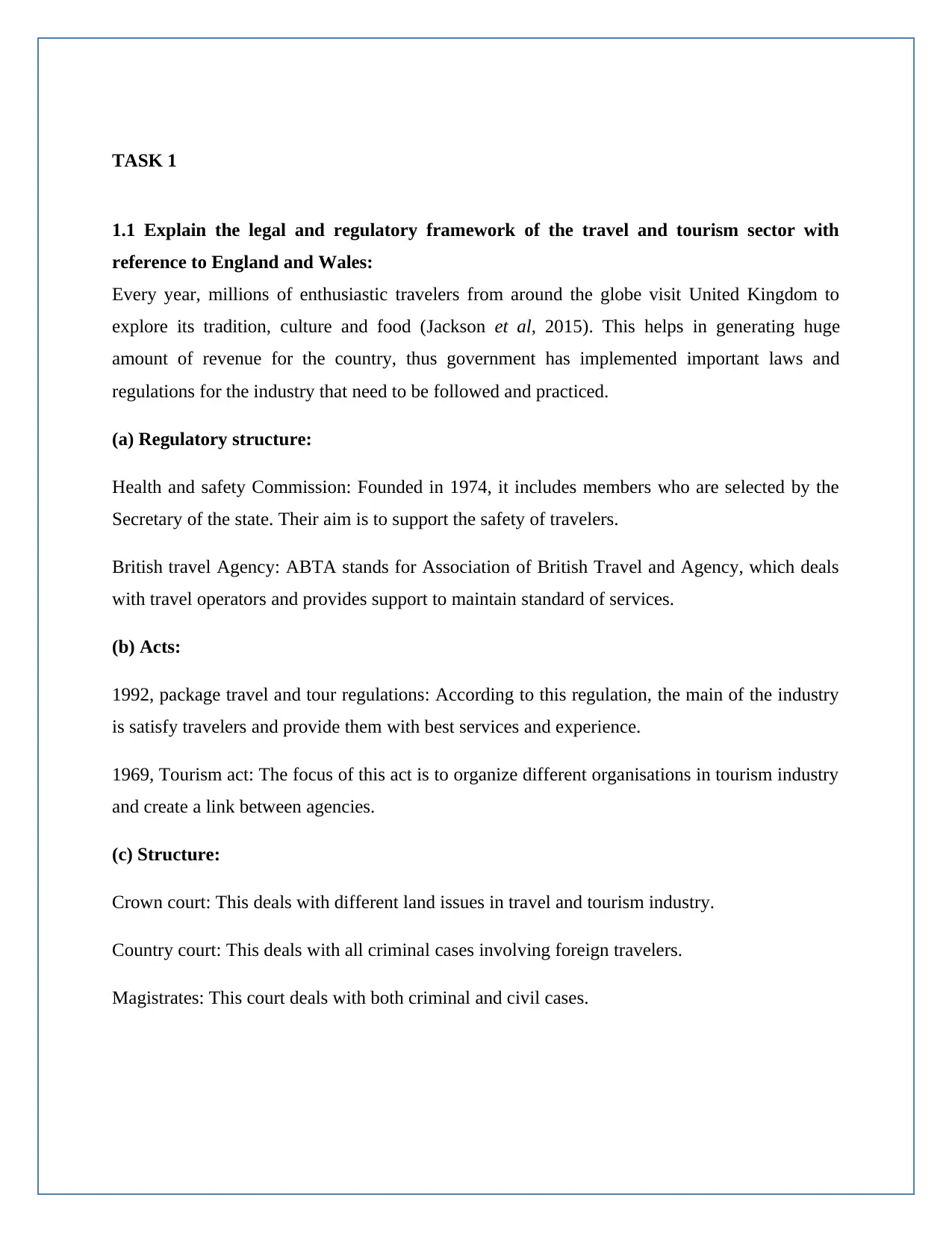
TASK 1
1.1 Explain the legal and regulatory framework of the travel and tourism sector with
reference to England and Wales:
Every year, millions of enthusiastic travelers from around the globe visit United Kingdom to
explore its tradition, culture and food (Jackson et al, 2015). This helps in generating huge
amount of revenue for the country, thus government has implemented important laws and
regulations for the industry that need to be followed and practiced.
(a) Regulatory structure:
Health and safety Commission: Founded in 1974, it includes members who are selected by the
Secretary of the state. Their aim is to support the safety of travelers.
British travel Agency: ABTA stands for Association of British Travel and Agency, which deals
with travel operators and provides support to maintain standard of services.
(b) Acts:
1992, package travel and tour regulations: According to this regulation, the main of the industry
is satisfy travelers and provide them with best services and experience.
1969, Tourism act: The focus of this act is to organize different organisations in tourism industry
and create a link between agencies.
(c) Structure:
Crown court: This deals with different land issues in travel and tourism industry.
Country court: This deals with all criminal cases involving foreign travelers.
Magistrates: This court deals with both criminal and civil cases.
1.1 Explain the legal and regulatory framework of the travel and tourism sector with
reference to England and Wales:
Every year, millions of enthusiastic travelers from around the globe visit United Kingdom to
explore its tradition, culture and food (Jackson et al, 2015). This helps in generating huge
amount of revenue for the country, thus government has implemented important laws and
regulations for the industry that need to be followed and practiced.
(a) Regulatory structure:
Health and safety Commission: Founded in 1974, it includes members who are selected by the
Secretary of the state. Their aim is to support the safety of travelers.
British travel Agency: ABTA stands for Association of British Travel and Agency, which deals
with travel operators and provides support to maintain standard of services.
(b) Acts:
1992, package travel and tour regulations: According to this regulation, the main of the industry
is satisfy travelers and provide them with best services and experience.
1969, Tourism act: The focus of this act is to organize different organisations in tourism industry
and create a link between agencies.
(c) Structure:
Crown court: This deals with different land issues in travel and tourism industry.
Country court: This deals with all criminal cases involving foreign travelers.
Magistrates: This court deals with both criminal and civil cases.
Paraphrase This Document
Need a fresh take? Get an instant paraphrase of this document with our AI Paraphraser
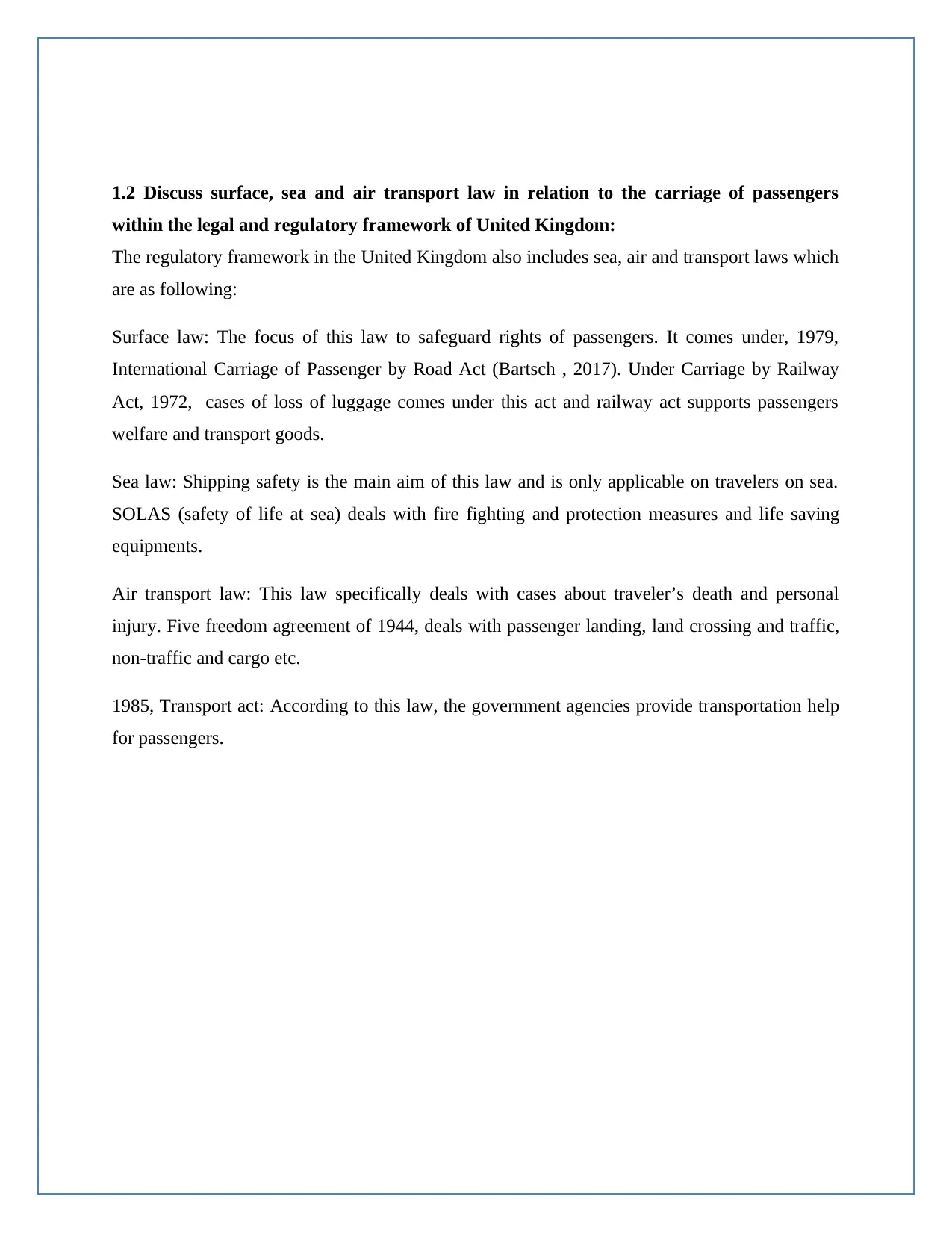
1.2 Discuss surface, sea and air transport law in relation to the carriage of passengers
within the legal and regulatory framework of United Kingdom:
The regulatory framework in the United Kingdom also includes sea, air and transport laws which
are as following:
Surface law: The focus of this law to safeguard rights of passengers. It comes under, 1979,
International Carriage of Passenger by Road Act (Bartsch , 2017). Under Carriage by Railway
Act, 1972, cases of loss of luggage comes under this act and railway act supports passengers
welfare and transport goods.
Sea law: Shipping safety is the main aim of this law and is only applicable on travelers on sea.
SOLAS (safety of life at sea) deals with fire fighting and protection measures and life saving
equipments.
Air transport law: This law specifically deals with cases about traveler’s death and personal
injury. Five freedom agreement of 1944, deals with passenger landing, land crossing and traffic,
non-traffic and cargo etc.
1985, Transport act: According to this law, the government agencies provide transportation help
for passengers.
within the legal and regulatory framework of United Kingdom:
The regulatory framework in the United Kingdom also includes sea, air and transport laws which
are as following:
Surface law: The focus of this law to safeguard rights of passengers. It comes under, 1979,
International Carriage of Passenger by Road Act (Bartsch , 2017). Under Carriage by Railway
Act, 1972, cases of loss of luggage comes under this act and railway act supports passengers
welfare and transport goods.
Sea law: Shipping safety is the main aim of this law and is only applicable on travelers on sea.
SOLAS (safety of life at sea) deals with fire fighting and protection measures and life saving
equipments.
Air transport law: This law specifically deals with cases about traveler’s death and personal
injury. Five freedom agreement of 1944, deals with passenger landing, land crossing and traffic,
non-traffic and cargo etc.
1985, Transport act: According to this law, the government agencies provide transportation help
for passengers.
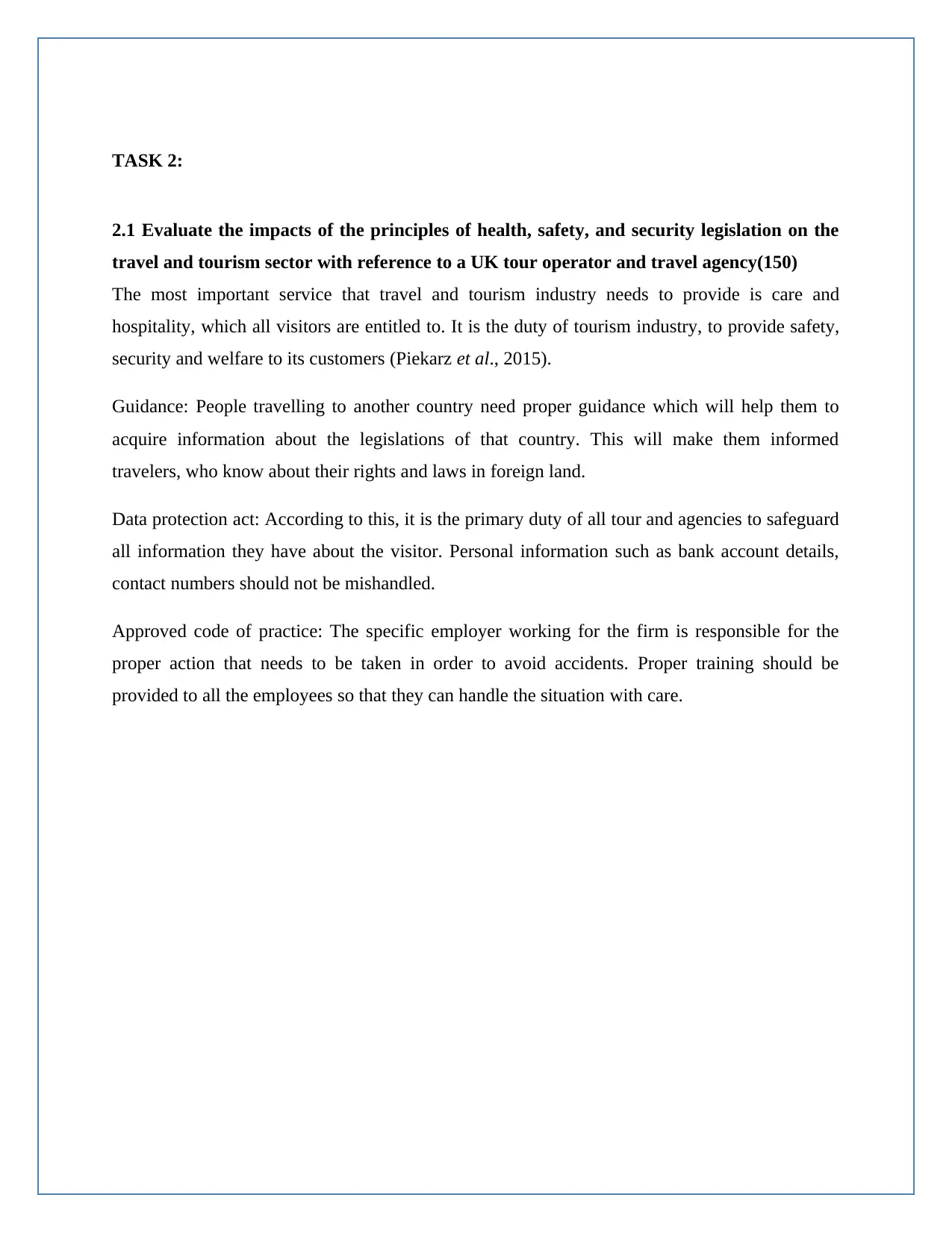
TASK 2:
2.1 Evaluate the impacts of the principles of health, safety, and security legislation on the
travel and tourism sector with reference to a UK tour operator and travel agency(150)
The most important service that travel and tourism industry needs to provide is care and
hospitality, which all visitors are entitled to. It is the duty of tourism industry, to provide safety,
security and welfare to its customers (Piekarz et al., 2015).
Guidance: People travelling to another country need proper guidance which will help them to
acquire information about the legislations of that country. This will make them informed
travelers, who know about their rights and laws in foreign land.
Data protection act: According to this, it is the primary duty of all tour and agencies to safeguard
all information they have about the visitor. Personal information such as bank account details,
contact numbers should not be mishandled.
Approved code of practice: The specific employer working for the firm is responsible for the
proper action that needs to be taken in order to avoid accidents. Proper training should be
provided to all the employees so that they can handle the situation with care.
2.1 Evaluate the impacts of the principles of health, safety, and security legislation on the
travel and tourism sector with reference to a UK tour operator and travel agency(150)
The most important service that travel and tourism industry needs to provide is care and
hospitality, which all visitors are entitled to. It is the duty of tourism industry, to provide safety,
security and welfare to its customers (Piekarz et al., 2015).
Guidance: People travelling to another country need proper guidance which will help them to
acquire information about the legislations of that country. This will make them informed
travelers, who know about their rights and laws in foreign land.
Data protection act: According to this, it is the primary duty of all tour and agencies to safeguard
all information they have about the visitor. Personal information such as bank account details,
contact numbers should not be mishandled.
Approved code of practice: The specific employer working for the firm is responsible for the
proper action that needs to be taken in order to avoid accidents. Proper training should be
provided to all the employees so that they can handle the situation with care.
⊘ This is a preview!⊘
Do you want full access?
Subscribe today to unlock all pages.

Trusted by 1+ million students worldwide
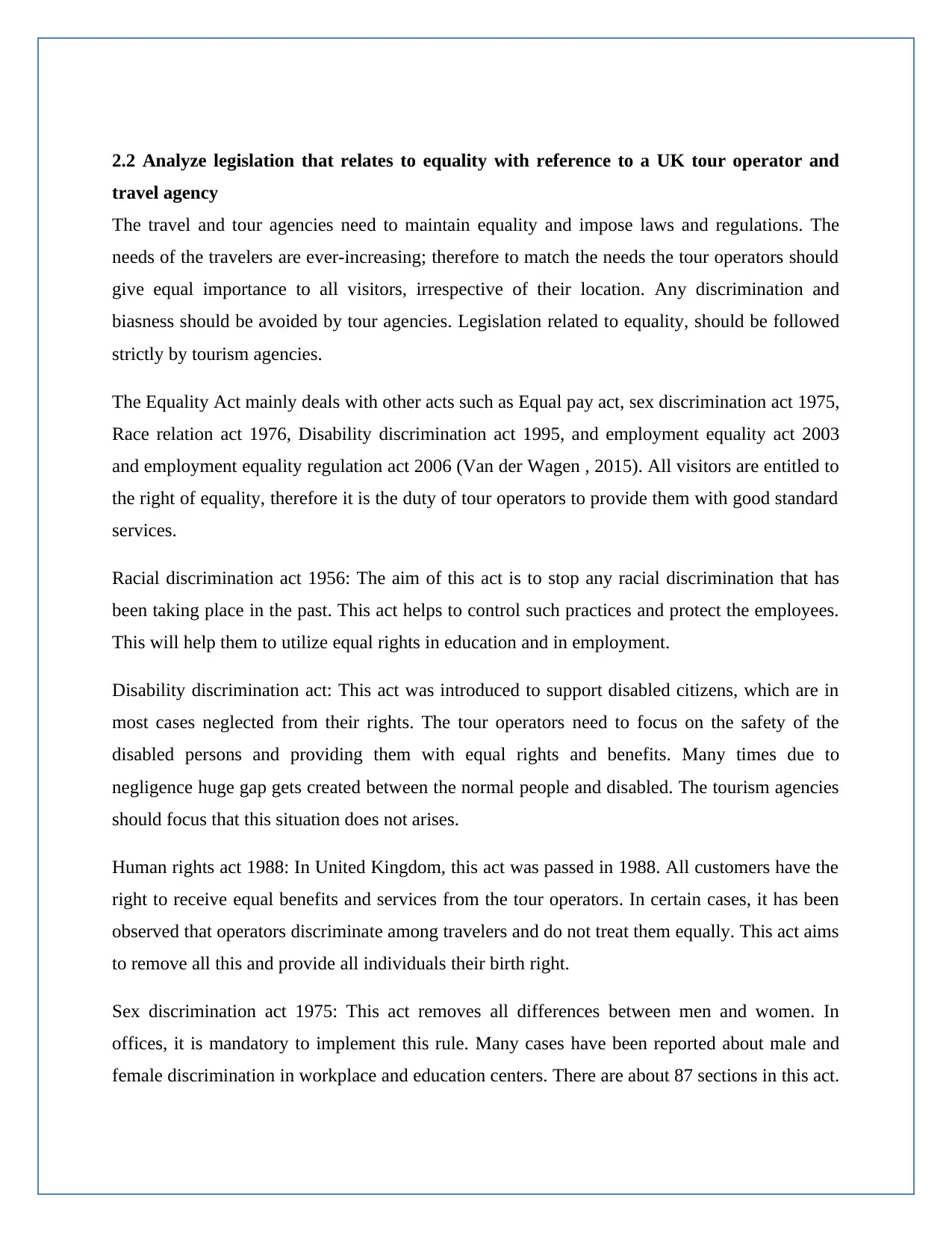
2.2 Analyze legislation that relates to equality with reference to a UK tour operator and
travel agency
The travel and tour agencies need to maintain equality and impose laws and regulations. The
needs of the travelers are ever-increasing; therefore to match the needs the tour operators should
give equal importance to all visitors, irrespective of their location. Any discrimination and
biasness should be avoided by tour agencies. Legislation related to equality, should be followed
strictly by tourism agencies.
The Equality Act mainly deals with other acts such as Equal pay act, sex discrimination act 1975,
Race relation act 1976, Disability discrimination act 1995, and employment equality act 2003
and employment equality regulation act 2006 (Van der Wagen , 2015). All visitors are entitled to
the right of equality, therefore it is the duty of tour operators to provide them with good standard
services.
Racial discrimination act 1956: The aim of this act is to stop any racial discrimination that has
been taking place in the past. This act helps to control such practices and protect the employees.
This will help them to utilize equal rights in education and in employment.
Disability discrimination act: This act was introduced to support disabled citizens, which are in
most cases neglected from their rights. The tour operators need to focus on the safety of the
disabled persons and providing them with equal rights and benefits. Many times due to
negligence huge gap gets created between the normal people and disabled. The tourism agencies
should focus that this situation does not arises.
Human rights act 1988: In United Kingdom, this act was passed in 1988. All customers have the
right to receive equal benefits and services from the tour operators. In certain cases, it has been
observed that operators discriminate among travelers and do not treat them equally. This act aims
to remove all this and provide all individuals their birth right.
Sex discrimination act 1975: This act removes all differences between men and women. In
offices, it is mandatory to implement this rule. Many cases have been reported about male and
female discrimination in workplace and education centers. There are about 87 sections in this act.
travel agency
The travel and tour agencies need to maintain equality and impose laws and regulations. The
needs of the travelers are ever-increasing; therefore to match the needs the tour operators should
give equal importance to all visitors, irrespective of their location. Any discrimination and
biasness should be avoided by tour agencies. Legislation related to equality, should be followed
strictly by tourism agencies.
The Equality Act mainly deals with other acts such as Equal pay act, sex discrimination act 1975,
Race relation act 1976, Disability discrimination act 1995, and employment equality act 2003
and employment equality regulation act 2006 (Van der Wagen , 2015). All visitors are entitled to
the right of equality, therefore it is the duty of tour operators to provide them with good standard
services.
Racial discrimination act 1956: The aim of this act is to stop any racial discrimination that has
been taking place in the past. This act helps to control such practices and protect the employees.
This will help them to utilize equal rights in education and in employment.
Disability discrimination act: This act was introduced to support disabled citizens, which are in
most cases neglected from their rights. The tour operators need to focus on the safety of the
disabled persons and providing them with equal rights and benefits. Many times due to
negligence huge gap gets created between the normal people and disabled. The tourism agencies
should focus that this situation does not arises.
Human rights act 1988: In United Kingdom, this act was passed in 1988. All customers have the
right to receive equal benefits and services from the tour operators. In certain cases, it has been
observed that operators discriminate among travelers and do not treat them equally. This act aims
to remove all this and provide all individuals their birth right.
Sex discrimination act 1975: This act removes all differences between men and women. In
offices, it is mandatory to implement this rule. Many cases have been reported about male and
female discrimination in workplace and education centers. There are about 87 sections in this act.
Paraphrase This Document
Need a fresh take? Get an instant paraphrase of this document with our AI Paraphraser
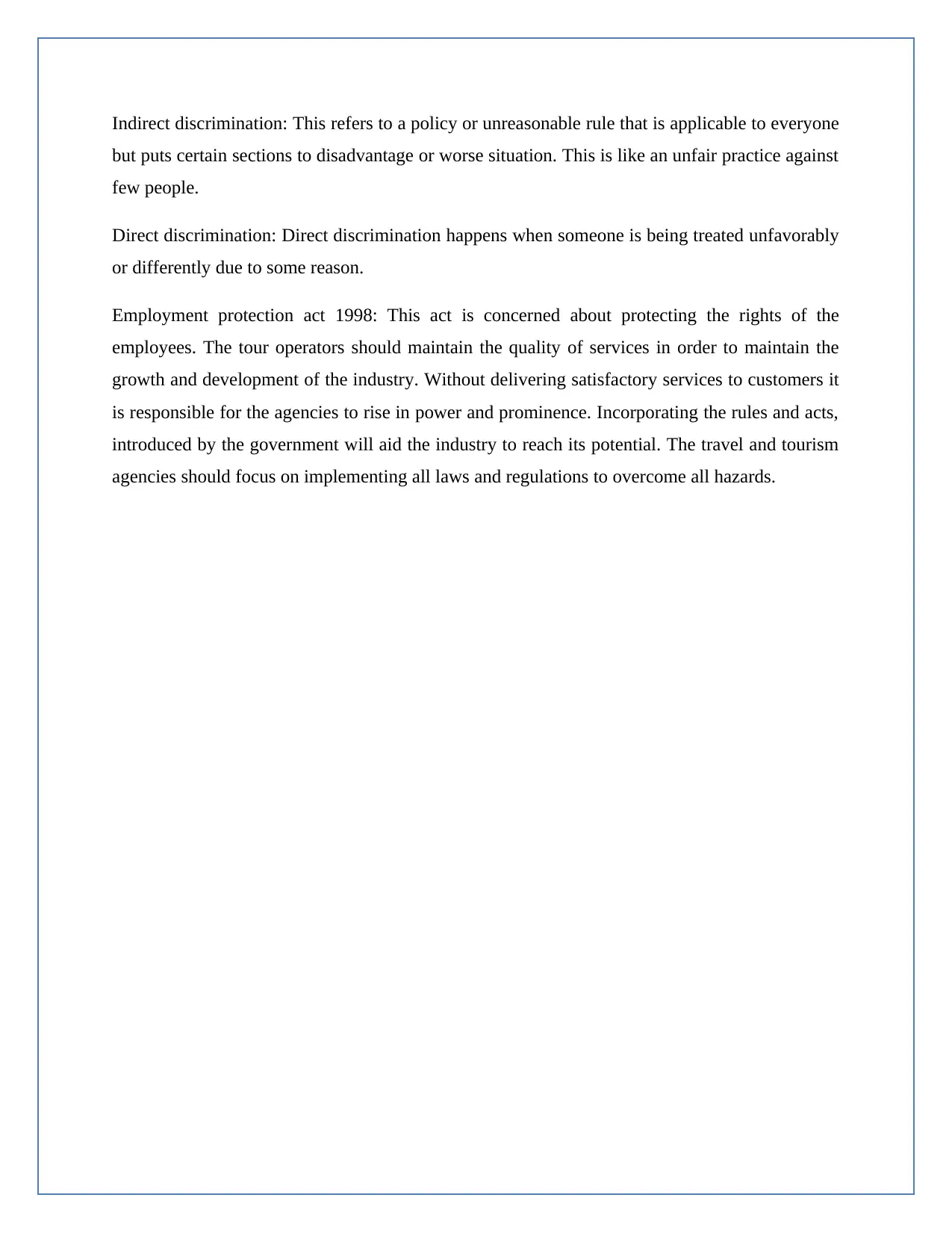
Indirect discrimination: This refers to a policy or unreasonable rule that is applicable to everyone
but puts certain sections to disadvantage or worse situation. This is like an unfair practice against
few people.
Direct discrimination: Direct discrimination happens when someone is being treated unfavorably
or differently due to some reason.
Employment protection act 1998: This act is concerned about protecting the rights of the
employees. The tour operators should maintain the quality of services in order to maintain the
growth and development of the industry. Without delivering satisfactory services to customers it
is responsible for the agencies to rise in power and prominence. Incorporating the rules and acts,
introduced by the government will aid the industry to reach its potential. The travel and tourism
agencies should focus on implementing all laws and regulations to overcome all hazards.
but puts certain sections to disadvantage or worse situation. This is like an unfair practice against
few people.
Direct discrimination: Direct discrimination happens when someone is being treated unfavorably
or differently due to some reason.
Employment protection act 1998: This act is concerned about protecting the rights of the
employees. The tour operators should maintain the quality of services in order to maintain the
growth and development of the industry. Without delivering satisfactory services to customers it
is responsible for the agencies to rise in power and prominence. Incorporating the rules and acts,
introduced by the government will aid the industry to reach its potential. The travel and tourism
agencies should focus on implementing all laws and regulations to overcome all hazards.
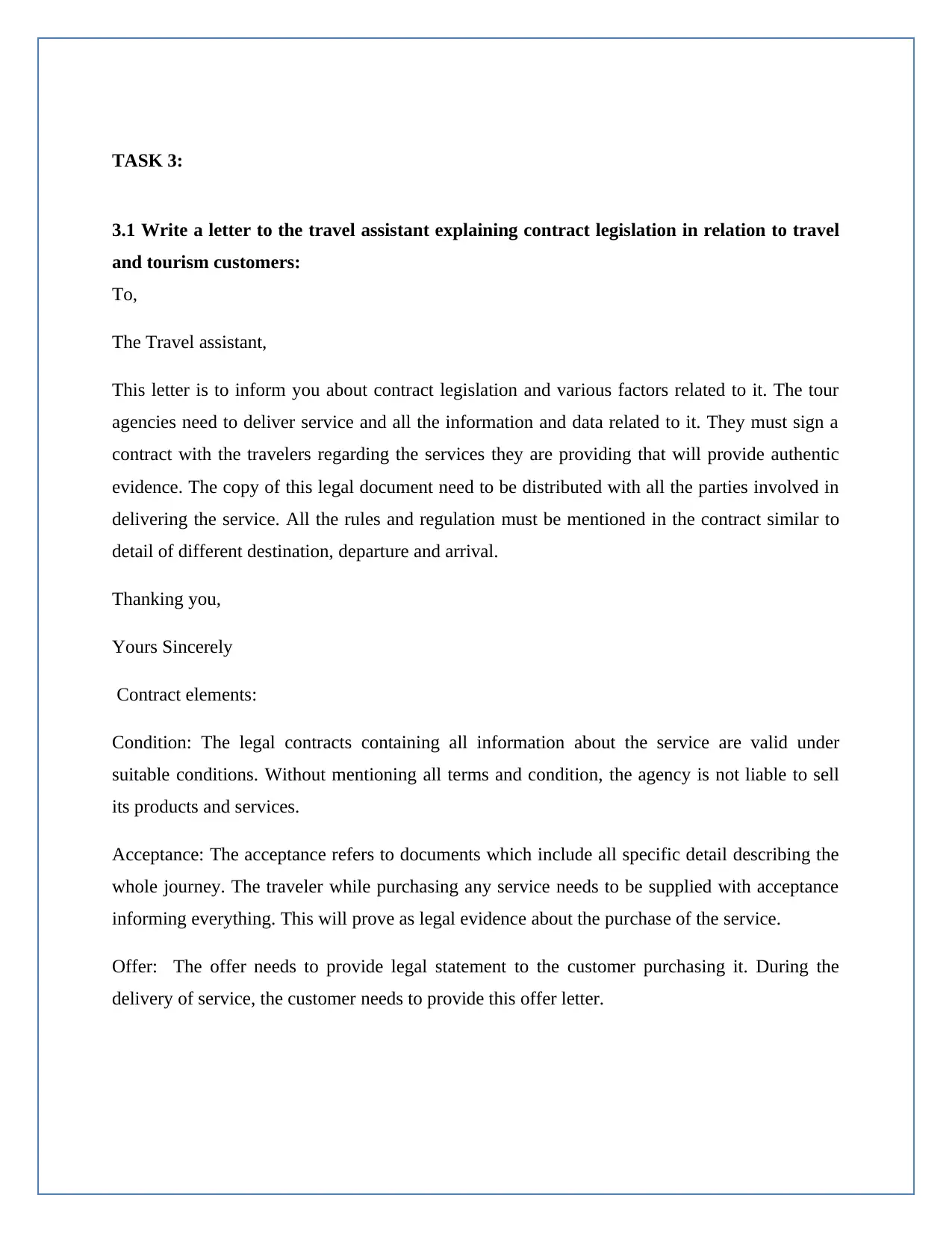
TASK 3:
3.1 Write a letter to the travel assistant explaining contract legislation in relation to travel
and tourism customers:
To,
The Travel assistant,
This letter is to inform you about contract legislation and various factors related to it. The tour
agencies need to deliver service and all the information and data related to it. They must sign a
contract with the travelers regarding the services they are providing that will provide authentic
evidence. The copy of this legal document need to be distributed with all the parties involved in
delivering the service. All the rules and regulation must be mentioned in the contract similar to
detail of different destination, departure and arrival.
Thanking you,
Yours Sincerely
Contract elements:
Condition: The legal contracts containing all information about the service are valid under
suitable conditions. Without mentioning all terms and condition, the agency is not liable to sell
its products and services.
Acceptance: The acceptance refers to documents which include all specific detail describing the
whole journey. The traveler while purchasing any service needs to be supplied with acceptance
informing everything. This will prove as legal evidence about the purchase of the service.
Offer: The offer needs to provide legal statement to the customer purchasing it. During the
delivery of service, the customer needs to provide this offer letter.
3.1 Write a letter to the travel assistant explaining contract legislation in relation to travel
and tourism customers:
To,
The Travel assistant,
This letter is to inform you about contract legislation and various factors related to it. The tour
agencies need to deliver service and all the information and data related to it. They must sign a
contract with the travelers regarding the services they are providing that will provide authentic
evidence. The copy of this legal document need to be distributed with all the parties involved in
delivering the service. All the rules and regulation must be mentioned in the contract similar to
detail of different destination, departure and arrival.
Thanking you,
Yours Sincerely
Contract elements:
Condition: The legal contracts containing all information about the service are valid under
suitable conditions. Without mentioning all terms and condition, the agency is not liable to sell
its products and services.
Acceptance: The acceptance refers to documents which include all specific detail describing the
whole journey. The traveler while purchasing any service needs to be supplied with acceptance
informing everything. This will prove as legal evidence about the purchase of the service.
Offer: The offer needs to provide legal statement to the customer purchasing it. During the
delivery of service, the customer needs to provide this offer letter.
⊘ This is a preview!⊘
Do you want full access?
Subscribe today to unlock all pages.

Trusted by 1+ million students worldwide
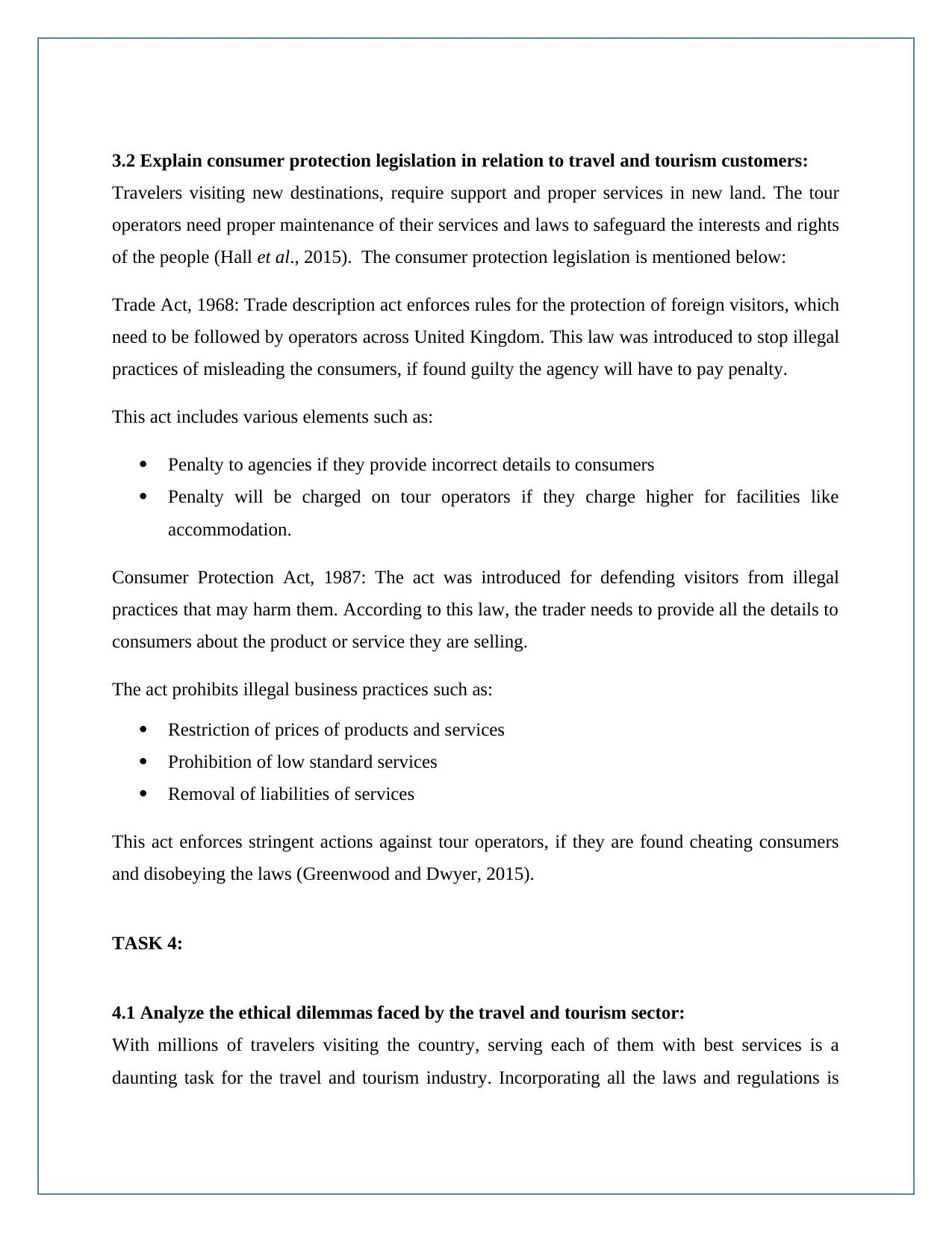
3.2 Explain consumer protection legislation in relation to travel and tourism customers:
Travelers visiting new destinations, require support and proper services in new land. The tour
operators need proper maintenance of their services and laws to safeguard the interests and rights
of the people (Hall et al., 2015). The consumer protection legislation is mentioned below:
Trade Act, 1968: Trade description act enforces rules for the protection of foreign visitors, which
need to be followed by operators across United Kingdom. This law was introduced to stop illegal
practices of misleading the consumers, if found guilty the agency will have to pay penalty.
This act includes various elements such as:
Penalty to agencies if they provide incorrect details to consumers
Penalty will be charged on tour operators if they charge higher for facilities like
accommodation.
Consumer Protection Act, 1987: The act was introduced for defending visitors from illegal
practices that may harm them. According to this law, the trader needs to provide all the details to
consumers about the product or service they are selling.
The act prohibits illegal business practices such as:
Restriction of prices of products and services
Prohibition of low standard services
Removal of liabilities of services
This act enforces stringent actions against tour operators, if they are found cheating consumers
and disobeying the laws (Greenwood and Dwyer, 2015).
TASK 4:
4.1 Analyze the ethical dilemmas faced by the travel and tourism sector:
With millions of travelers visiting the country, serving each of them with best services is a
daunting task for the travel and tourism industry. Incorporating all the laws and regulations is
Travelers visiting new destinations, require support and proper services in new land. The tour
operators need proper maintenance of their services and laws to safeguard the interests and rights
of the people (Hall et al., 2015). The consumer protection legislation is mentioned below:
Trade Act, 1968: Trade description act enforces rules for the protection of foreign visitors, which
need to be followed by operators across United Kingdom. This law was introduced to stop illegal
practices of misleading the consumers, if found guilty the agency will have to pay penalty.
This act includes various elements such as:
Penalty to agencies if they provide incorrect details to consumers
Penalty will be charged on tour operators if they charge higher for facilities like
accommodation.
Consumer Protection Act, 1987: The act was introduced for defending visitors from illegal
practices that may harm them. According to this law, the trader needs to provide all the details to
consumers about the product or service they are selling.
The act prohibits illegal business practices such as:
Restriction of prices of products and services
Prohibition of low standard services
Removal of liabilities of services
This act enforces stringent actions against tour operators, if they are found cheating consumers
and disobeying the laws (Greenwood and Dwyer, 2015).
TASK 4:
4.1 Analyze the ethical dilemmas faced by the travel and tourism sector:
With millions of travelers visiting the country, serving each of them with best services is a
daunting task for the travel and tourism industry. Incorporating all the laws and regulations is
Paraphrase This Document
Need a fresh take? Get an instant paraphrase of this document with our AI Paraphraser
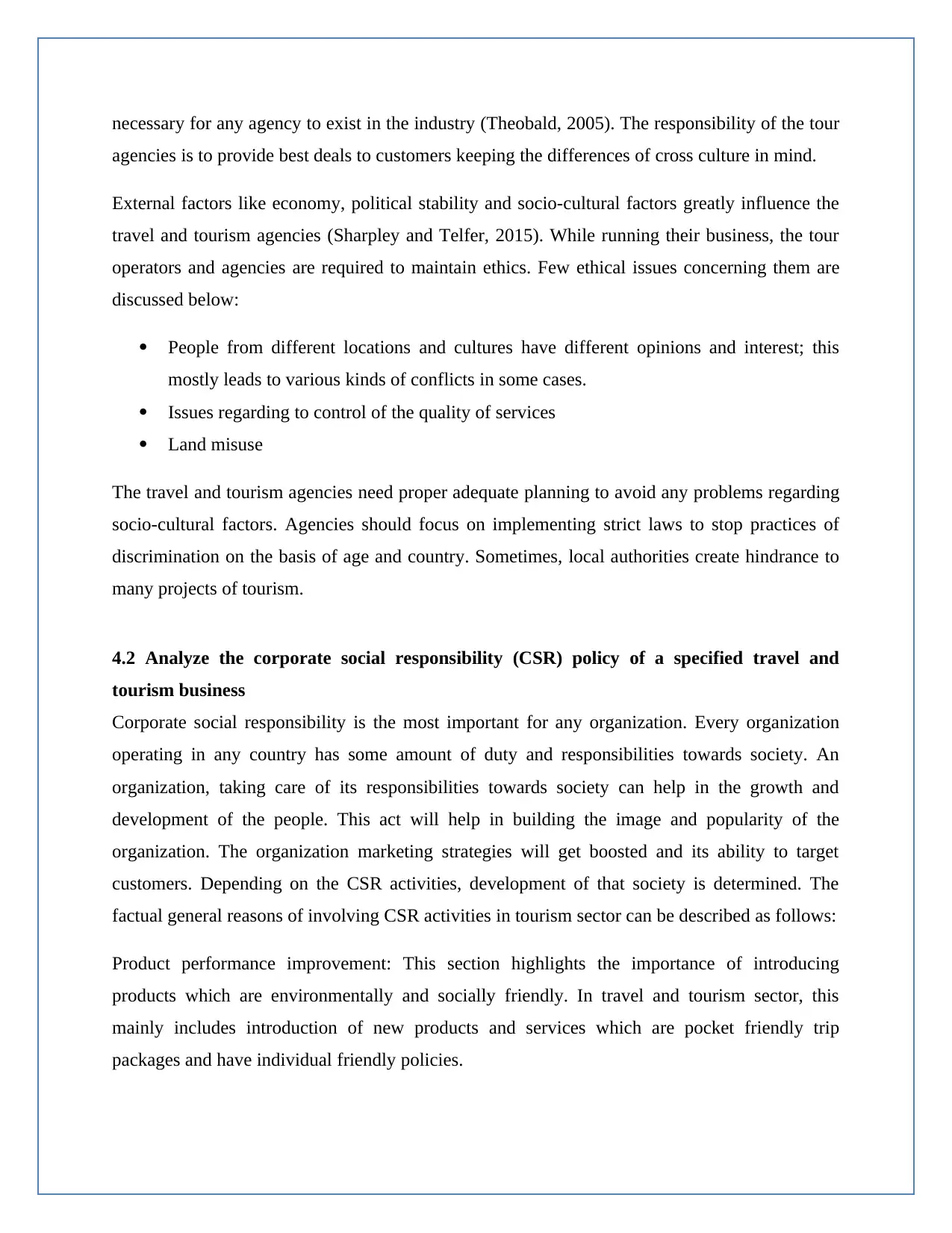
necessary for any agency to exist in the industry (Theobald, 2005). The responsibility of the tour
agencies is to provide best deals to customers keeping the differences of cross culture in mind.
External factors like economy, political stability and socio-cultural factors greatly influence the
travel and tourism agencies (Sharpley and Telfer, 2015). While running their business, the tour
operators and agencies are required to maintain ethics. Few ethical issues concerning them are
discussed below:
People from different locations and cultures have different opinions and interest; this
mostly leads to various kinds of conflicts in some cases.
Issues regarding to control of the quality of services
Land misuse
The travel and tourism agencies need proper adequate planning to avoid any problems regarding
socio-cultural factors. Agencies should focus on implementing strict laws to stop practices of
discrimination on the basis of age and country. Sometimes, local authorities create hindrance to
many projects of tourism.
4.2 Analyze the corporate social responsibility (CSR) policy of a specified travel and
tourism business
Corporate social responsibility is the most important for any organization. Every organization
operating in any country has some amount of duty and responsibilities towards society. An
organization, taking care of its responsibilities towards society can help in the growth and
development of the people. This act will help in building the image and popularity of the
organization. The organization marketing strategies will get boosted and its ability to target
customers. Depending on the CSR activities, development of that society is determined. The
factual general reasons of involving CSR activities in tourism sector can be described as follows:
Product performance improvement: This section highlights the importance of introducing
products which are environmentally and socially friendly. In travel and tourism sector, this
mainly includes introduction of new products and services which are pocket friendly trip
packages and have individual friendly policies.
agencies is to provide best deals to customers keeping the differences of cross culture in mind.
External factors like economy, political stability and socio-cultural factors greatly influence the
travel and tourism agencies (Sharpley and Telfer, 2015). While running their business, the tour
operators and agencies are required to maintain ethics. Few ethical issues concerning them are
discussed below:
People from different locations and cultures have different opinions and interest; this
mostly leads to various kinds of conflicts in some cases.
Issues regarding to control of the quality of services
Land misuse
The travel and tourism agencies need proper adequate planning to avoid any problems regarding
socio-cultural factors. Agencies should focus on implementing strict laws to stop practices of
discrimination on the basis of age and country. Sometimes, local authorities create hindrance to
many projects of tourism.
4.2 Analyze the corporate social responsibility (CSR) policy of a specified travel and
tourism business
Corporate social responsibility is the most important for any organization. Every organization
operating in any country has some amount of duty and responsibilities towards society. An
organization, taking care of its responsibilities towards society can help in the growth and
development of the people. This act will help in building the image and popularity of the
organization. The organization marketing strategies will get boosted and its ability to target
customers. Depending on the CSR activities, development of that society is determined. The
factual general reasons of involving CSR activities in tourism sector can be described as follows:
Product performance improvement: This section highlights the importance of introducing
products which are environmentally and socially friendly. In travel and tourism sector, this
mainly includes introduction of new products and services which are pocket friendly trip
packages and have individual friendly policies.
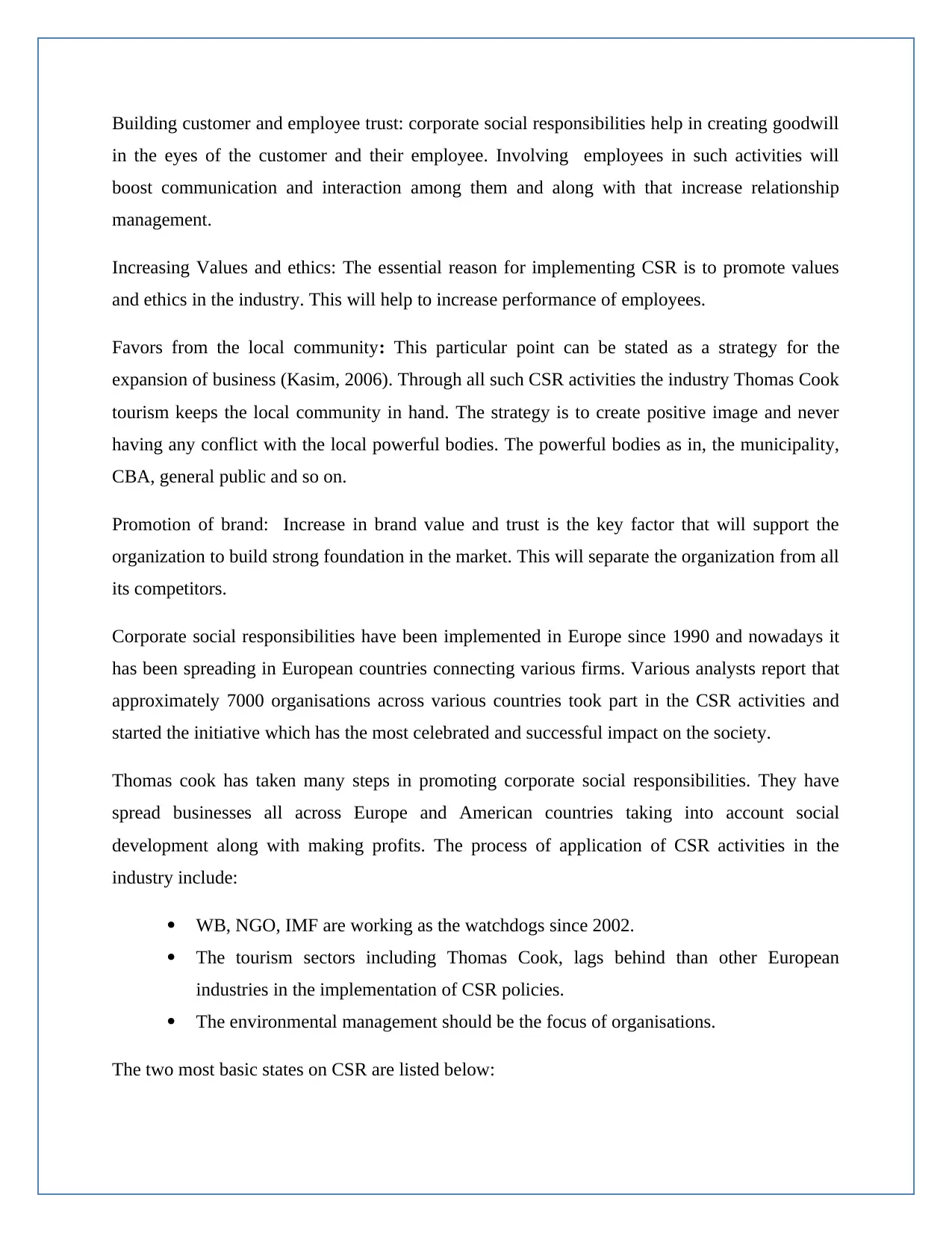
Building customer and employee trust: corporate social responsibilities help in creating goodwill
in the eyes of the customer and their employee. Involving employees in such activities will
boost communication and interaction among them and along with that increase relationship
management.
Increasing Values and ethics: The essential reason for implementing CSR is to promote values
and ethics in the industry. This will help to increase performance of employees.
Favors from the local community: This particular point can be stated as a strategy for the
expansion of business (Kasim, 2006). Through all such CSR activities the industry Thomas Cook
tourism keeps the local community in hand. The strategy is to create positive image and never
having any conflict with the local powerful bodies. The powerful bodies as in, the municipality,
CBA, general public and so on.
Promotion of brand: Increase in brand value and trust is the key factor that will support the
organization to build strong foundation in the market. This will separate the organization from all
its competitors.
Corporate social responsibilities have been implemented in Europe since 1990 and nowadays it
has been spreading in European countries connecting various firms. Various analysts report that
approximately 7000 organisations across various countries took part in the CSR activities and
started the initiative which has the most celebrated and successful impact on the society.
Thomas cook has taken many steps in promoting corporate social responsibilities. They have
spread businesses all across Europe and American countries taking into account social
development along with making profits. The process of application of CSR activities in the
industry include:
WB, NGO, IMF are working as the watchdogs since 2002.
The tourism sectors including Thomas Cook, lags behind than other European
industries in the implementation of CSR policies.
The environmental management should be the focus of organisations.
The two most basic states on CSR are listed below:
in the eyes of the customer and their employee. Involving employees in such activities will
boost communication and interaction among them and along with that increase relationship
management.
Increasing Values and ethics: The essential reason for implementing CSR is to promote values
and ethics in the industry. This will help to increase performance of employees.
Favors from the local community: This particular point can be stated as a strategy for the
expansion of business (Kasim, 2006). Through all such CSR activities the industry Thomas Cook
tourism keeps the local community in hand. The strategy is to create positive image and never
having any conflict with the local powerful bodies. The powerful bodies as in, the municipality,
CBA, general public and so on.
Promotion of brand: Increase in brand value and trust is the key factor that will support the
organization to build strong foundation in the market. This will separate the organization from all
its competitors.
Corporate social responsibilities have been implemented in Europe since 1990 and nowadays it
has been spreading in European countries connecting various firms. Various analysts report that
approximately 7000 organisations across various countries took part in the CSR activities and
started the initiative which has the most celebrated and successful impact on the society.
Thomas cook has taken many steps in promoting corporate social responsibilities. They have
spread businesses all across Europe and American countries taking into account social
development along with making profits. The process of application of CSR activities in the
industry include:
WB, NGO, IMF are working as the watchdogs since 2002.
The tourism sectors including Thomas Cook, lags behind than other European
industries in the implementation of CSR policies.
The environmental management should be the focus of organisations.
The two most basic states on CSR are listed below:
⊘ This is a preview!⊘
Do you want full access?
Subscribe today to unlock all pages.

Trusted by 1+ million students worldwide
1 out of 14
Related Documents
Your All-in-One AI-Powered Toolkit for Academic Success.
+13062052269
info@desklib.com
Available 24*7 on WhatsApp / Email
![[object Object]](/_next/static/media/star-bottom.7253800d.svg)
Unlock your academic potential
Copyright © 2020–2026 A2Z Services. All Rights Reserved. Developed and managed by ZUCOL.


